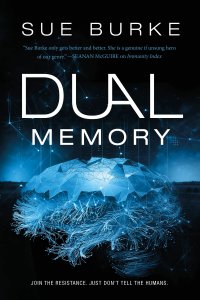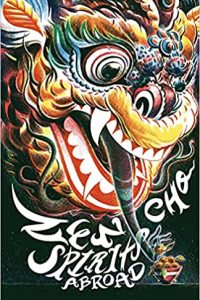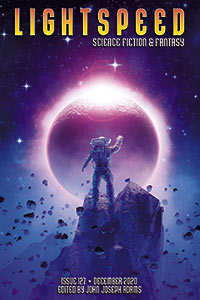Paul Di Filippo Reviews Dual Memory by Sue Burke
 Dual Memory, Sue Burke (Tor 978-1250809131, hardcover, 352pp, $29.99) May 2023
Dual Memory, Sue Burke (Tor 978-1250809131, hardcover, 352pp, $29.99) May 2023
A small plucky polity full of rebellious freethinkers, under siege by outside aggressors, is led to victory by a quirky Artificial Intelligence eager to assist its humans, using asymmetric warfare. Of course, that’s Heinlein’s The Moon Is a Harsh Mistress, right? Right, but not in today’s particular case. Because we are talking about Sue Burke’s fourth novel, Dual Memory (and shame on me that I have not encountered this excellent writer’s work before now), which, with a little trimming, fits my RAH synopsis.
But from another angle, the dominant theme of this book is not military-decolonial SF at all, but seems remarkably prescient, ripped from today’s headlines, since it concerns the making of art by an AI, and the nature of human creativity.
Yet from whatever vantage you choose to appreciate this book, you will be richly rewarded with both a thrilling adventure and a reflective philosophical presentation.
The time is several generations from now, and our planet has been through the typically forecasted shattering eco-sociopolitical dislocations. But these are offstage and in the past, as Burke zeroes in on her chosen venue: the city of Thule, home to 20,000 citizens.
“Everyone calls us Thules, but that’s really the name of the isle. We’re the Sovereign Practitioners Association. We built this isle to create a home for ourselves.”
I know a little about it. On the scow, a coworker boasted that her great-grandfather served for five years as assistant pilot of a massive barge taking wreckage from submerged or smashed cities to create Thule. Basically, the cities paid to have rubble hauled away, and it was dumped at the Arctic Circle.
Allow me to ring in an allied book at this point, Sam Miller’s wonderful Blackfish City.
The first-person narrator in the passage above is our hero, Antonio Moro. Raised in refugee camps, he’s made a lowly life for himself working on a garbage scow. He’s got native wit, but little education. And he’s also taught himself something about art, stoking his own innate talents. When his scow arrives at Thule, the city is under attack by the Leviathan League, who are basically roving stateless freebooters. Lacking its own armed forces, Thule has hired some professional mercenaries, the Bronzewing soldiers, to defend it. Antonio impulsively casts his lot with them, following an urge for romance and adventure. Danger and death in a noble cause are preferable to his old nowhere life.
But he’s wounded in the fight, deposited on Thule as the Bronzewings depart, and becomes a ward of the semi-beneficent community. His social workers soon find him a job—based on his exaggerated account of his own artistic skills and experiences—working for rich people who conduct a trade in “ExtraT’s.” These are alien organisms from throughout the Solar System, traded like exotic wildlife is today. (I get a real PKD vibe from this aspect of the novel, sort of a Galactic Pot-Healer riff.)
Now Antono must make good on his assertions of talent, all while dealing with haughty rich folks, rival artists, officious bureaucrats, unappreciative audiences, and other invariant dilemmas of an artist’s condition.
But here comes the real complication: Thule is a networked creation of intelligent things. Every building has its resident mind, every tablet communicates with every coffee pot and baby buggy. For the most part, these minds are not fully sentient. But then one of them does manage to bootstrap itself into full personhood, and takes the name “Par Augustus, Venerable Companion.” And, as Antonio’s luck would have it, Par fastens on him as “owner” and special friend. Having a pocket AI that can literally open doors, fudge official records, allocate art supplies and do even greater things for you makes life both easier and immensely harder. (Tendrils from this novum extend out not only to Heinlein, but also to Budrys’s Michaelmas and Bester’s The Computer Connection.) Later on in the book, we will encounter another AI who is even superior to Par, the Prior Edifice.
Burke presents a complicated Machiavellian plot amongst all the ExtraT set which Antonio must maneuver through to survive. But when the Leviathan League raiders return for another attack, the stakes grow even higher.
I must say that in creating Par—who fancies himself an artist—Burke has rendered a character who rivals other classic AI’s from Heinlein’s Mike on down in sheer extravagant personality. He basically steals any scene he’s in. We come to empathize and understand Antonio’s heart and soul, and he’s indeed a winning figure whose quest has a beautiful arc. But Par is such a delightfully off-kilter individual that he lights up each page. Part of his attraction derives from speech patterns that are just weird enough to evoke nonhuman consciousness. This is a trick Aldiss used to great effect in “Who Can Replace a Man?”.
“They introduced some slight irregularities,” Par says in a pretentious tone. “The evident human intervention will represent the triumph of art over destruction. This is a living artificialia. Regarding a different quiddity, isn’t this music somnolent?”
Par is making up words, I’m sure of it. As soon as the art fair is over, I’ll make it tell me what it really is.
“Yes, this is fine music, and thank you both.”
“Switzer wants you to make an appointment.”
“Can I say that I’m busy?”
“I’ll relay that. It’s my job.”
“Thank you.” What isn’t its job?
“Tetry is in the elevator,” Chatelaine says.
“Thank you for the warning.”
She steps off the elevator, pointedly looks around, and says, predictably, “This place is a disaster.”
“Waves of creativity will not conform.” Par has switched to the chiming voice.
“Hasn’t that thing driven you crazy yet?”
I smile with all my charm. “We’re working together.”
“Art by humans or machines?”
Also, when one machine is talking to another, they exhibit strange politesse and protocols.
Par had never felt panic before—but it had lost contact with Tonio, which hurt the way pain must agonize humans. Worse, with Chatelaine erased and most buildings still terrified by the attack or preoccupied with the weather, it had no one to talk to. Tonio had always been a willing ear. And Tonio was bleeding!
Then he was taken to the Prior Edifice. Par desperately needed information.
“If I may, Prior Edifice system, if you don’t mind, are you available?”
“Always for you. You seem to have a concern, if you are comfortable presenting it.”
Ultimately, after many rewarding and suspenseful moments, Antonio’s travails, his heartbreaks and striving, lead him to a more mature, albeit scarred condition. Thule will ultimately flourish as well. And as for Par, well he’s off to see the world and make it his own!
 While you are here, please take a moment to support Locus with a one-time or recurring donation. We rely on reader donations to keep the magazine and site going, and would like to keep the site paywall free, but WE NEED YOUR FINANCIAL SUPPORT to continue quality coverage of the science fiction and fantasy field.
While you are here, please take a moment to support Locus with a one-time or recurring donation. We rely on reader donations to keep the magazine and site going, and would like to keep the site paywall free, but WE NEED YOUR FINANCIAL SUPPORT to continue quality coverage of the science fiction and fantasy field.
©Locus Magazine. Copyrighted material may not be republished without permission of LSFF.







